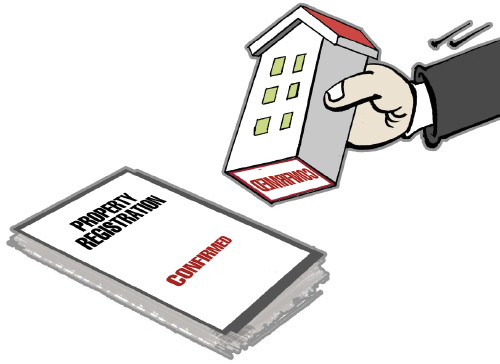|
 |
|
(XINHUA) |
The effects
The development of the regulations has garnered a lot of attention, with the public and some media outlets speculating that anti-corruption efforts and a drive to levy taxes would be major goals of the move. Meanwhile, the government has made several statements, reiterating that the move has nothing to do with anti-corruption efforts.
Zhang Dawei, an analyst at Centaline Property, a real estate agency, said that some cities are seeing more luxury apartments for sale as the registration system moves forward. Speculative investment in the property sector might flow into other sectors on expectation of a property tax raising the costs of holding property assets.
"The data collected through the system will allow new taxes, such as a property tax and an inheritance tax," said Hu Jinghui, Vice President of China's major real estate agency 5i5j.com.
Hu believes that many factors affect housing prices, including supply and demand and credit policies. He sees registration as just one of the indirect, long-term elements influencing prices.
"Registration will help us know exactly how many properties are there--how many people own homes and how many do not," said Li Yang, Vice President of the Chinese Academy of Social Sciences (CASS), "the effect on property prices needs to be watched."
Sun Xianzhong, a legal researcher with the CASS, said that the regulations are in a "totally different arena" along with those laws that guarantee the transparency of officials' assets. The information in the property registry will only be available to people who have a direct interest in a real estate deal.
Cheng Xiao, a law professor with Tsinghua University who helped draw up the regulations, said that the major objective is to clarify property rights, because clear property rights are the bedrock of the efficient functioning of a market economy.
"The clarity of 'who owns what' is critical for enabling market deals and ensuring the security of transactions," said Cheng. "There have been many cases in which a buyer found that their newly purchased house did not belong to those who sold it or that the unit had been sealed by public security authorities. Unified real estate registration is an infrastructure project. It can facilitate anti-corruption and tax collection efforts, but that's an incidental function, not the original purpose."
Cheng stresses security, which is a major aim of the registration system. "The registration system protects the information applicants register about their properties. It is not a system whereby anyone can look up how many houses a particular person has under his or her name," said Cheng.
Chen Huai, a former policy researcher at the MOHURD, expounds on another aim of the registration system--organization and efficiency.
"What the registration system intends to achieve, as the rules show, is in essence the integration of the information about housing and other immovable properties in a single register so that the unified management of such information can be realized," said Chen. "A property ownership registration regulation is a key foundation stone for China's market economy; like all civil laws, it will protect the market economy, effectively protect ordinary people's property rights, and increase the convenience of buying and selling."
Gu Yunchang, a property policy adviser with the MOHURD, said that even though the registration lays the foundation for imposing property tax, it will take several years to complete the registration process, so the effect will fall short of public expectations.
"It is too early to talk about the impact. Actually, other factors have a greater impact on home prices, including demand and supply, taxation and overall economic conditions," Gu said.
A report released in December 2014 by an institute under the CASS said that home prices are very likely to decline further in 2015 and cities that still restrict multiple-home purchasing are expected to scrap the policy. Property downturn since the beginning of 2014 has prompted most of the cities that had restricted home purchases to ease them.
The CASS report estimated a 5-percent drop in home prices across the country in 2015. Annual sales are expected to fall by 12 percent, while residential property investment is expected to grow by 10 percent.
According to data from the National Bureau of Statistics, home sales in the first 11 months of 2014 fell by 9.7 percent from a year ago, while residential property investment grew by 10.5 percent.
| 